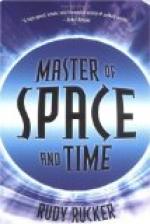There was in the mill a machine—I don’t know what it was for—but it whirled its contents, whatever it was, around in a drum. I thought, “Why wouldn’t the husks come off if the raw wheat was whirled around in that drum?” So back I went to the miller and suggested the idea to him.
“Why,” he said, “that’s a good idea.” So he called his foreman and they tried it, and the husks came off beautifully, and they’ve been taking husks off that way ever since. That was my very first invention, and it led me to thinking for myself, and really had quite an influence on my way and methods of thought.
Up to his sixteenth year young Bell’s reading consisted largely of novels, poetry, and romantic tales of Scotch heroes. But in addition he was picking up some knowledge of anatomy, music, electricity, and telegraphy. When he was but sixteen years of age his father secured for him a position as teacher of elocution and this necessarily turned his thought into more serious channels. He now spent his leisure studying sound. During this period he made several discoveries in sound which were of some small importance.
When he was twenty-one years of age he went to London and there had the good fortune to come to the attention of Charles Wheatstone and Alex J. Ellis. Ellis was at that time president of the London Philological Society, and had translated Helmholtz’s The Sensation of Tone into English. He had made no little progress with sound, and demonstrated to Bell the methods by which German scientists had caused tuning-forks to vibrate by means of electro-magnets and had combined the tones of several tuning-forks in an effort to reproduce the sound of the human voice. Helmholtz had performed this experiment simply to demonstrate the physical basis of sound, and seems to have had no idea of its possible use in telephony.
That an electro-magnet could vibrate a tuning-fork and so produce sound was an entirely new and fascinating idea to the youth. It appealed to his imagination, quickened by his knowledge of speech. “Why not an electrical telegraph?” he asked himself. His idea seems to have been that the electric current could carry different notes over the wire and reproduce them by means of the electro-magnet. Although Bell did not know it, many others were struggling with the same problem, the answer to which proved most elusive. It gave Bell a starting-point, and the search for the telephone began.
Sir Charles Wheatstone was then England’s leading man of science, and so Bell sought his counsel. Wheatstone received the young man and listened to his statement of his ideas and ambitions and gave him every encouragement. He showed him a talking-machine which had recently been invented by Baron de Kempelin, and gave him the opportunity to study it closely. Thus Bell, the eager student, the unknown youth of twenty-two, came under the influence of Wheatstone, the famous scientist and inventor of sixty-seven. This influence played a great part in shaping Bell’s career, arousing as it did his passion for science. This decided him to devote himself to the problem of reproducing sounds by mechanical means. Thus a new improvement in the means of human communication was being sought and another pioneer of science was at work.




